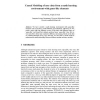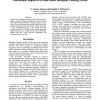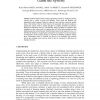234 search results - page 15 / 47 » Detecting Student Misuse of Intelligent Tutoring Systems |
118
click to vote
UMUAI
2008
15 years 1 months ago
2008
Abstract. Self-efficacy is an individual's belief about her ability to perform well in a given situation. Because selfefficacious students are effective learners, endowing int...
127
click to vote
AIED
2011
Springer
14 years 5 months ago
2011
Springer
We have created a math learning environment with game-like elements such as narrative, visual feedback, personalization, collection, etc. We made a study with four different versio...
132
click to vote
FLAIRS
2011
14 years 5 months ago
2011
iSTART is an intelligent tutoring system (ITS) designed to improve students’ reading comprehension. Previous studies have indicated that iSTART is successful; however, these stu...
131
Voted
AIED
2005
Springer
15 years 7 months ago
2005
Springer
Students approach the learning opportunity offered by intelligent tutoring systems with a variety of goals and attitudes. These goals and attitudes can substantially affect student...
AIED
2007
Springer
15 years 8 months ago
2007
Springer
: This paper proposes the notion of problem templates (PTs), a concept based on theories of memory and expertise. These mental constructs allow experts to quickly recognise problem...



